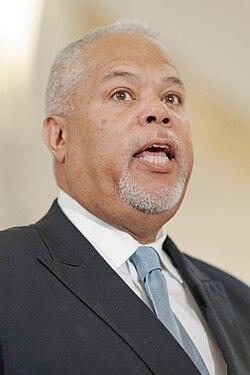Anthony Hardy Williams Challenges Charlie Kirk’s Role in Philadelphia Politics
Williams Voices Concerns Over Kirk’s Growing Political Influence
Veteran Philadelphia politician Anthony Hardy Williams has recently expressed strong opposition to the increasing presence of conservative commentator Charlie Kirk in the city’s political arena. Williams argues that Kirk’s involvement threatens the community-focused values that have long defined Philadelphia’s local leadership. He warns that Kirk’s promotion of national conservative agendas often overlooks the city’s distinct social and political realities, risking the erosion of progress achieved through grassroots activism over many years.
Williams pinpointed several critical issues with Kirk’s tactics, including:
- Ignoring local nuances: Applying broad national policies without tailoring them to Philadelphia’s specific challenges.
- Divisive communication style: Amplifying conflicts instead of encouraging constructive community conversations.
- Targeting youth with polarizing methods: Engaging young voters through provocative campaigns rather than inclusive civic education.
| Focus Area | Williams’ Perspective | Kirk’s Method |
|---|---|---|
| Community Engagement | Prioritizes local partnerships and collaboration | Advocates for nationwide conservative policies |
| Communication Approach | Seeks unity and common ground | Employs confrontational and provocative rhetoric |
| Youth Involvement | Focuses on inclusive civic participation | Mobilizes youth through contentious activism |
Analyzing the Effects of Kirk’s Messaging on Philadelphia’s Communities
Williams has openly condemned Kirk’s inflammatory rhetoric, which many local leaders believe intensifies divisions within Philadelphia’s culturally diverse neighborhoods. He points out that Kirk’s oversimplified narratives often fail to capture the complexity of social issues, fostering discord rather than solidarity. This approach, Williams argues, alienates vulnerable populations and hampers efforts to implement equitable policies and social reforms.
- Community Impact: Rising polarization and erosion of trust among residents.
- Youth Consequences: Exposure to divisive messaging leading to increased anxiety and political disengagement.
- Political Outcomes: Challenges to collaborative governance essential for urban progress.
| Dimension | Observed Effect | Williams’ Response |
|---|---|---|
| Social Cohesion | Fragmented neighborhoods and communities | Advocates for empathy and open dialogue |
| Political Environment | Increased partisan hostility | Calls for balanced and respectful discourse |
| Youth Civic Engagement | Declining participation in community affairs | Supports comprehensive civic education programs |
Williams stresses that Philadelphia’s strength is rooted in its diverse population and the spirit of cooperation among its residents. He urges political figures and influencers to reject divisive rhetoric and instead promote messages that encourage mutual respect, understanding, and shared progress.
Demanding Greater Responsibility in Political Communication
Anthony Hardy Williams has called out Charlie Kirk for what he terms the “irresponsible dissemination of misleading information and polarizing speech.” Highlighting the importance of honesty in public discourse, Williams insists that political leaders must be accountable for their words. “When public conversations are dominated by falsehoods and personal attacks, it damages public confidence and weakens democratic institutions,” he remarked in a recent interview.
Williams outlined several key measures to improve the quality of political dialogue, emphasizing transparency and accountability:
- Ensuring factual integrity: Verifying claims and statements before public dissemination.
- Promoting respectful debate: Facilitating evidence-based discussions that cross ideological divides.
- Implementing consequences for misinformation: Establishing penalties to deter deliberate spread of false information.
| Accountability Strategy | Intended Outcome |
|---|---|
| Fact-Checking Programs | Confirm accuracy of public statements |
| Transparency Guidelines | Reveal sources and affiliations to the public |
| Ethics Oversight Committees | Monitor adherence to communication standards |
Building Bridges: Approaches to Unite Philadelphia and Counteract Division
In response to escalating political tensions, Philadelphia’s leaders advocate for comprehensive strategies aimed at fostering unity and reducing polarization. Central to these efforts are community engagement programs that encourage residents to participate actively in conversations addressing shared challenges. Initiatives such as neighborhood dialogues and partnerships across sectors are designed to cultivate trust and transparency among diverse groups, thereby countering misinformation and promoting a collective vision for the city’s future.
Education also plays a pivotal role in combating divisive narratives. Enhancing media literacy in schools and community centers equips individuals with the skills to critically evaluate information and resist polarizing content. Key initiatives include:
- Organizing workshops on digital literacy and fact verification for both youth and adults.
- Supporting independent local journalism that prioritizes unbiased, community-centered reporting.
- Forging collaborations with faith-based and civic organizations to facilitate dialogues emphasizing shared values and common goals.
| Initiative | Goal | Primary Participants |
|---|---|---|
| Community Dialogue Forums | Strengthen communication and understanding | Local Residents, City Officials |
| Media Literacy Education | Reduce misinformation and promote critical thinking | Educational Institutions, Nonprofits |
| Faith and Civic Collaboration | Encourage unity and shared purpose | Religious Leaders, Community Organizations |
Conclusion: Navigating Philadelphia’s Political Divide
As Philadelphia’s political discourse continues to evolve, Anthony Hardy Williams’ pointed critique of Charlie Kirk highlights the growing ideological rifts shaping the city’s public conversations. Williams’ stance underscores the urgent need for responsible leadership and accountability in political communication. With both figures maintaining significant influence in their respective domains, the outcomes of this ideological clash will likely reverberate through Philadelphia’s political and community spheres in the years ahead.


